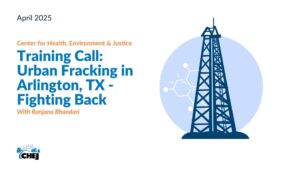Toxic Tuesday
Carbon disulfide is a colorless liquid chemical that readily evaporates at room temperature. It occurs naturally during composting and volcanic eruptions, but most carbon disulfide is… [Read more]
Hydraulic fracturing (commonly known as fracking) is a technique that uses pressurized liquid to fracture bedrock in order to the extract the oil or gas inside. Materials in the fracking fluid keep… [Read more]
Training Calls

Liveable Arlington is a grassroots environmental advocacy organization in the Barnett shale city of Arlington, Texas. Arlington is an egregious example of “urban drilling” – where the city permits multi-well fracking sites to extract methane/fossil gas right next to homes and daycares. Emissions from these sites accelerate climate breakdown, and also cause severe health issues for our frontline community.
Learn about our advocacy for intergenerational, climate and environmental justice, our past successes, and current challenges, and hear from impacted community members via a short film.
…. [Watch now]
Backyard Talk Blogs
By Ben Chisam. On January 16, 2025, a fire broke out in Moss Landing, California at the world’s largest lithium-ion battery storage facility. The fire burned for several days, and 1,200 residents were temporarily evacuated. While this was the fourth fire at the… [Read more]
By Ken Grossinger. Strongmen all want the same thing. They want us to feel powerless. When we feel we don’t make a difference, that’s when they win. But long before Trump, Musk, and their sycophants began to demean and attack environmental… [Read more]
By Juliet Porter. At the start of April, devastating storms swept across parts of the Midwest and Southeastern United States, bringing tornadoes, violent winds, and catastrophic flooding. Millions of Americans were affected as rivers overflowed… [Read more]
By Leila Waid. A recently published systematic review article analyzed effective methods for increasing heat literacy. A systematic review summarizes the current scientific literature by synthesizing multiple studies and providing the lessons learned. In this case… [Read more]
Every day, people facing threats to their health and environment call CHEJ for help. They are looking for proof that all landfills leak, health studies linking incinerators to cancer, or the environmental record of a… [Read more]
Do you find this information useful? Please consider pitching in and making a contribution to CHEJ. We appreciate your support!


